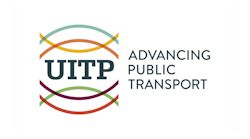UITP (International Association of Public Transport) recently announced new members that reflect the dynamic shift of public transportation and mobility throughout the world. Some of the new members included companies such as Uber, Moovel, Via, Door2Door and Citymapper, which are under a newly created subsection in the membership called “Digital Platforms.” Those members offer access to services or assets, such as trip planning tools or ride-sharing via the internet.
UITP Secretary General Alain Flausch said in large cities, strong public rail is often the backbone of mobility, but there are growing partnerships with these companies for the first-last-mile. “We’re wasting public money,” he said, “and that can’t continue.” These companies can optimize the cost-benefit to the community as they are much more agile and client-minded.
He continued, “In many American cities, public transportation is not as good as it can be and new partners – or competitors – are growing because there is an open space.”
He said it’s important to start a conversation with these companies to, “try to organize a new mobility ecosystem.” He continued, “In the U.S., it’s not developed, but the concept of Mobility as a Service (MaaS), … we can offer people options, depending on what they need.
“Clearly MaaS awareness has to be developed,” he said. “But that’s not the case in Europe.”
With congestion and quality of air a more dire concern there, it’s being talked about more, he said.
Environmental issues have always been a priority for Flausch and with climate change becoming a political issue, he suggested, “The meetings be held in New Delhi or Beijing where people are dying every day.
“We are destroying the world by greed for growth … something is wrong.
“I’m trying to help. I bring my tool – efficient, quality public transit for people to travel with no damage to the planet.”
Sharing expertise, UITP recently held its International Rail Forum for North American in Washington, D.C., which brought rail transit professionals from across the United States — and from around the world — together to share best practices of the industry.
Flausch said a focus of the well-attended forum was diversifying rail system revenue. It looked how transit agencies could be a resource to leverage commercial opportunities and generating other revenue streams for future investment.
“It needs to be more sustainable in the long run,” Flausch said. “The U.S. is not diversifying their source of revenue. We thought we could bring … some expertise from overseas.”
He also mentioned they have a close relationship with the New York Metropolitan Transportation Authority and the MTA, as well as many legacy systems were not happy with service and representation they were getting and, Flausch pointed out, there are plenty of “new” 40-year-old systems now facing their second life.
“Politicians are not good on maintenance and state of good repair,” said Flausch. “For two years now, we have been trying to bring to the U.S., a lot of technical knowledge about rail.”
Next year it will be held in Los Angeles, California, in October to address the concerns of every major U.S. legacy system, he shared.




